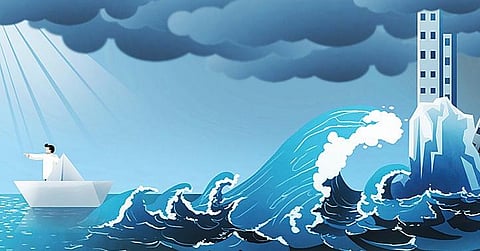

A centuries-old hotel in a sleepy Calcutta street. A realtor trying to bend heritage rules so that he can raze the building and put up a shopping mall. A storytelling game suggested by a clairvoyant monk successfully warding off the developer’s evil eye. Can stories really protect us from doom? Sure, they can. As the impact of homo economicus runs our planet off the rails, we are slowly waking up to the importance of stories in imagining alternative futures, influencing action or at the least, holding off an impending apocalypse.
From climate change, which is the biggest emergency facing us today, to ‘code red’ events like the Covid-19 outbreak, our living planet has been soiled by the dark and heavy fingerprints of our species. Which is why, this age is often called the Anthropocene. Now, it is being realised that by telling stories, we can resist the slow slide to chaos and prepare for a just, equitable and environment-conscious future. Telling stories in a variety of avatars from novels and cinema to sustainability-themed videos and board games.
Let’s take climate fiction or what is fashionably, following Dan Bloom’s coinage, called cli-fi. A 2018 study of readers by Matthew Schneider-Mayerson of Yale-NUS College found that cli-fi sensitised readers with ‘a newfound awareness of our reliance on and embeddedness in fragile ecosystems’. When it comes to conveying this sense of our connection to the animate and inanimate world, what scientific information and public messages can do, stories can definitely do better.
The probable transfer of a bat coronavirus via smuggled pangolins to humans in a Chinese wet market for live flesh and the greenhouse gas emissions driving our energy-guzzling economies, along with the devastating and wide-ranging impacts of both, are but two manifestations of this connection. While Covid-19 spreads like wildfire, scientists also warn that our planet has crossed a number of climate tipping points, posing an existential threat to civilisation. Yet where are our own stories of climate change and its associated evils, which range from crop failures to disease outbreaks?
The Global Environment Outlook Report (GEO-6) estimates that nearly 40 million Indians will be at risk from rising sea levels by 2050. Contrast this with the fact that the number of fiction titles and movies with climate themes published by south Asians can be counted on the fingers of both hands.
The mismatch can be partly explained by the differently tinted glasses of our post-colonial fiction writing with its gaze on power and ecological or climate fiction, which foregrounds the environment. Still we find authors like Amitav Ghosh bridging this divide though the fact remains that in our part of the world we are not reading and writing enough climate stories.
This doesn’t bode well for preparedness. While there can be debates around the kind of plots and settings—dystopian or utopian, single protagonist or collectives, techno-fixes or social remedies—that are effective in influencing attitudes and driving action, there is hardly any doubt that climate stories can help us better engage the future. Jeffrey Barber, a member of the Global Research Forum on Sustainable Production and Consumption, believes stories are very useful for dealing with political and religious polarisation around climate change. ‘Rational argument about climate science does not work for those ideologically committed,’ he says, ‘which is why stories are important, especially if they can effectively address the underside of the ideology.’
A few months ago, I was speaking at a sustainability event in a Hong Kong university where we discussed the value of stories and the narrative art in communicating better futures while laying the foundation for a repository of successful ecological initiatives, which could enrich the work of creative writers. Also, it has been argued that some of the future worlds found in novels, for example in Kim Stanley Robinson’s Pacific Edge, can be good templates for planners and policy makers to chart out pathways to those ‘imagined’ lands.
Schneider-Mayerson’s cli-fi study, quoted earlier, found that liberals and younger people are more inclined towards climate stories. He also discovered that cli-fi can nudge them from being ‘cautious’ to ‘concerned’ or from ‘concerned’ to ‘alarmed’ about climate change. Moreover, a number of readers in this study could connect their cli-fi reading with actions taken consequently. These findings do offer hope. For even if we don’t have magic on our side as in the tale of that grand old hotel, stories about desirable futures can indeed go far in helping us contemplate and blueprint for a better tomorrow.
Rajat Chaudhuri Author and climate-change activist Twitter @rajatchaudhuri